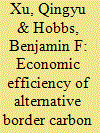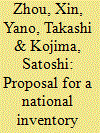| Srl | Item |
| 1 |
ID:
179723


|
|
|
|
|
| Summary/Abstract |
This paper provides a review of the recent academic literature on how individual countries or regions can successfully implement unilateral climate policies in an increasingly integrated world economy. It first reviews the theory, empirics and future projections of ‘carbon leakage’, i.e. the notion that more ambitious climate policies will pose an incentive for energy-intensive industries to relocate and thus undo at least some of the achieved emission reductions. It then discusses measures to reduce carbon leakage. These include free allocation of emission permits to firms deemed at risk of carbon leakage, targeted trade policies as well as international cooperation to promote climate policies in third countries. Finally, it provides an overview of the debate on responsibility for trade-related emissions, including production- and consumption-based emission accounting as well as some more recent approaches.
|
|
|
|
|
|
|
|
|
|
|
|
|
|
|
|
| 2 |
ID:
179729


|
|
|
|
|
| Summary/Abstract |
To be effective, policies addressing power sector carbon emissions in jurisdictions that are embedded in larger carbon markets must account for carbon embodied in imports and the potential for leakage. Yet analyses of alternative border carbon adjustment (BCA) policies that carefully model the impact of generation mix, net load distributions, and transmission limits are rare in the literature. With a generation-transmission expansion planning model of Western North America, we compare the impacts of alternative BCA schemes that California's carbon pricing system could implement. These include no BCA, facility (import source)-based deemed emission rate, a facility-neutral and constant (over-time) rate, and a facility-neutral and dynamic rate. Our results suggest that, when compared to no BCA or BCA using facility-based deemed rates, a facility-neutral BCA can improve efficiency by simultaneously lowering market-wide emissions and costs without raising California consumer expenditures. Emissions leakage also declines significantly. The precise value of the deemed rate affects these gains; setting it equal to marginal emission rates external to California is most efficient. We also show that California's carbon pricing encourages more interstate transmission expansion because power imports become more profitable. However, BCAs that cost-effectively lower total regional emissions will dampen those incentives.
|
|
|
|
|
|
|
|
|
|
|
|
|
|
|
|
| 3 |
ID:
126609


|
|
|
|
|
| Publication |
2013.
|
| Summary/Abstract |
In this paper we pointed out a hidden inequality in accounting for trade-related emissions in the presence of border carbon adjustment. Under a domestic carbon pricing policy, producers pay for the carbon costs in exchange for the right to emit. Under border carbon adjustment, however, the exporting country pays for the carbon costs of their exports to the importing country but not be given any emission credits. As a result, export-related emissions will be remained in the national inventory of the exporting country based on the UNFCCC inventory approach. This hidden inequality is important to climate policy but has not yet been pointed out. To address this issue we propose a method of National Inventory Adjustment for Trade, by which export-related emissions will be deducted from the national inventory of the exporting country and added to the national inventory of the importing country which implements border carbon adjustment. To assess the policy impacts, we simulated a carbon tax policy with border tax adjustment for Japan using a multi-region computable general equilibrium model. The results indicate that with the National Inventory Adjustment for Trade, both Japan's national inventory and the carbon leakage effects of Japan's climate policy will be greatly different.
|
|
|
|
|
|
|
|
|
|
|
|
|
|
|
|